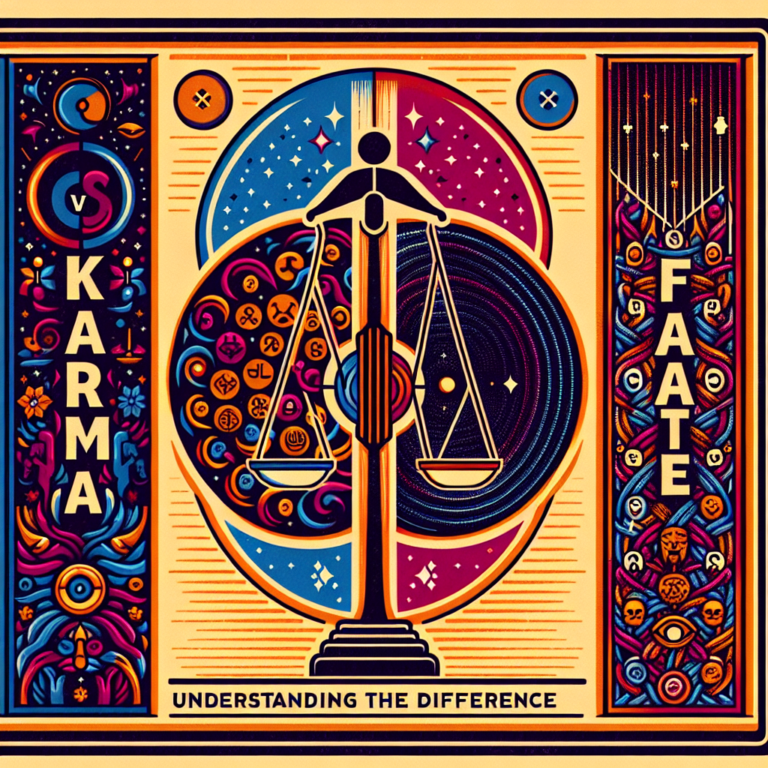The concept of karma has long been rooted in spiritual and philosophical traditions, primarily within Eastern belief systems. It suggests an interconnectedness of actions and consequences, not merely as a moral framework but as a significant influence on our well-being. The relationship between karma and wellness goes beyond philosophical discussions to touch upon the very fabric of how our daily actions impact our mental and physical health.
Understanding Karma
What is Karma?
Karma refers to the principle of cause and effect, where every action, thought, or intention generates an energy that will eventually return to the individual. It encapsulates the idea that our actions have consequences, which may not manifest immediately but will eventually come full circle. This can be neutral, positive, or negative, creating a cycle that influences our future experiences.
Karma in Different Cultures
While the term “karma” is most commonly associated with Hinduism and Buddhism, similar concepts exist in various cultures. For instance, in the Native American philosophy, the idea of “the web of life” communicates that all actions affect the collective, drawing parallels to karmic law. In Western thought, notions of “what goes around, comes around,” reflect the essence of karma, even if not labeled as such.
The Science Behind Karma
Modern science is increasingly acknowledging the impact of our actions on our health. The psychological principle of reciprocity, the social exchange theory, and numerous studies on the benefits of kindness and altruism illustrate the tangible health benefits stemming from positive actions.
The Connection Between Karma and Wellness
How Actions Influence Health
Your actions shape more than just your current reality; they influence your health, relationships, and overall quality of life. Here’s how:
- Positive Actions and Health: Engaging in healthy behaviors like exercising, eating well, and practicing mindfulness fosters physical and mental well-being.
- Negative Actions and Health: Conversely, actions fueled by anger, jealousy, or hatred can lead to stress, anxiety, and physical ailments.
The Physical Manifestations of Karma
Stress, anxiety, and negative emotional states that arise from harmful actions can have severe physical consequences, including hypertension, cardiovascular diseases, and other stress-related disorders. Taking the idea of karma into account encourages individuals to foster positivity not just for moral reasons but also for the sake of their health.
Mental Wellness and Karma
Mental health is intricately intertwined with karma. Engaging in negative behavior can lead to feelings of guilt, shame, and isolation, all of which can impact mental health. By consciously choosing positive actions—like helping others, expressing gratitude, or practicing compassion—individuals can cultivate a healthier mental state and potentially mitigate mental health issues.
Implementing Positive Karma Into Daily Life
Practicing Mindfulness
Mindfulness is the practice of being fully present and aware of your thoughts and actions. By cultivating mindfulness, you become more conscious of your actions’ impacts, allowing you to make deliberate, positive choices that can enhance your wellness.
Acts of Kindness
Regularly engage in acts of kindness, whether small or significant, to build a positive karmic footprint. Simple acts, like helping a neighbor or volunteering in your community, can generate waves of positive energy that contribute not only to your well-being but also to the health of those around you.
Forgiveness and Letting Go
Holding onto grudges or negative feelings can be detrimental to your health. Practicing forgiveness—both towards others and yourself—can alleviate the burden of negativity. This process is beneficial for mental clarity and emotional stability, fostering a healthier lifestyle.
Healthy Relationships
Surrounding yourself with supportive, positive individuals can enhance your health and well-being. By nurturing positive relationships, you create an environment that fosters shared joy and mental wellness—essential components of good health.
The Ripple Effect of Your Actions
Understanding the Ripple Effect
The ripple effect of our actions signifies that what we do not only affects us but also reverberates through our community and the world at large. Positive actions lead to a cycle of goodwill that enhances communal health, while negative actions can contribute to a toxic environment.
Community Engagement and Well-being
Participating in community wellness initiatives fosters a collective sense of responsibility and promotes positive health outcomes. Working towards common goals, like improving public health or creating greener spaces, can nurture not only your wellness but also that of your community.
Research on Karma and Health
The Link Between Altruism and Health
Research increasingly shows that altruistic behavior can significantly improve health outcomes. Studies indicate that individuals who regularly engage in helping others often report higher levels of happiness and lower levels of stress, illustrating the profound impact of karma on health.
The Role of Positive Psychology
Positive psychology emphasizes the importance of positive emotions and actions in cultivating personal well-being. The tenets of positive psychology align closely with the principles of karma, advocating for an empirical study of how good deeds can enhance one’s overall health.
Conclusion
The intricate relationship between karma and wellness underscores the profound saying, “What you do comes back to you.” Our actions, thoughts, and intentions weave into a complex tapestry influencing not only our health but also the collective well-being of those around us. By consciously choosing positive actions—be it through kindness, mindfulness, or community involvement—we cultivate a more profound sense of wellness that reverberates throughout our lives.
As we journey through life, let us remember that every action carries energy, returning to us in numerous ways. Emphasizing the importance of our choices can pave the way for healthier living, proving that karma isn’t just a philosophical construct but a vital part of our holistic health.
FAQs
1. What is karma?
Karma is the principle of cause and effect where an individual’s actions influence their future experiences, often reflected in terms of positive or negative consequences.
2. How can positive actions improve my health?
Positive actions can enhance your mental and physical health by reducing stress, fostering happiness, and cultivating a supportive community that contributes to overall well-being.
3. Is there scientific research supporting the connection between karma and wellness?
Yes, various studies have shown that altruistic behaviors and positive actions can lead to improved health outcomes, including lower stress levels and higher overall happiness.
4. How can I implement positive karma in my daily life?
You can engage in mindfulness, practice acts of kindness, focus on forgiveness, and cultivate healthy relationships to foster positive karma in your life.
5. Can negative actions affect my health?
Yes, negative actions can lead to increased stress, anxiety, and a host of physical ailments that can impact your overall health and well-being.
It seems like your message is incomplete. Could you please provide more details or specify what kind of prompt you’re looking for? Whether it’s for writing, a creative project, or something else, I’d be happy to help!, #Karma #Wellness #Actions #Influence #Health, #Karma #Wellness #Actions #Influence #Health, 1734307192, karma-and-wellness-how-your-actions-influence-your-health





